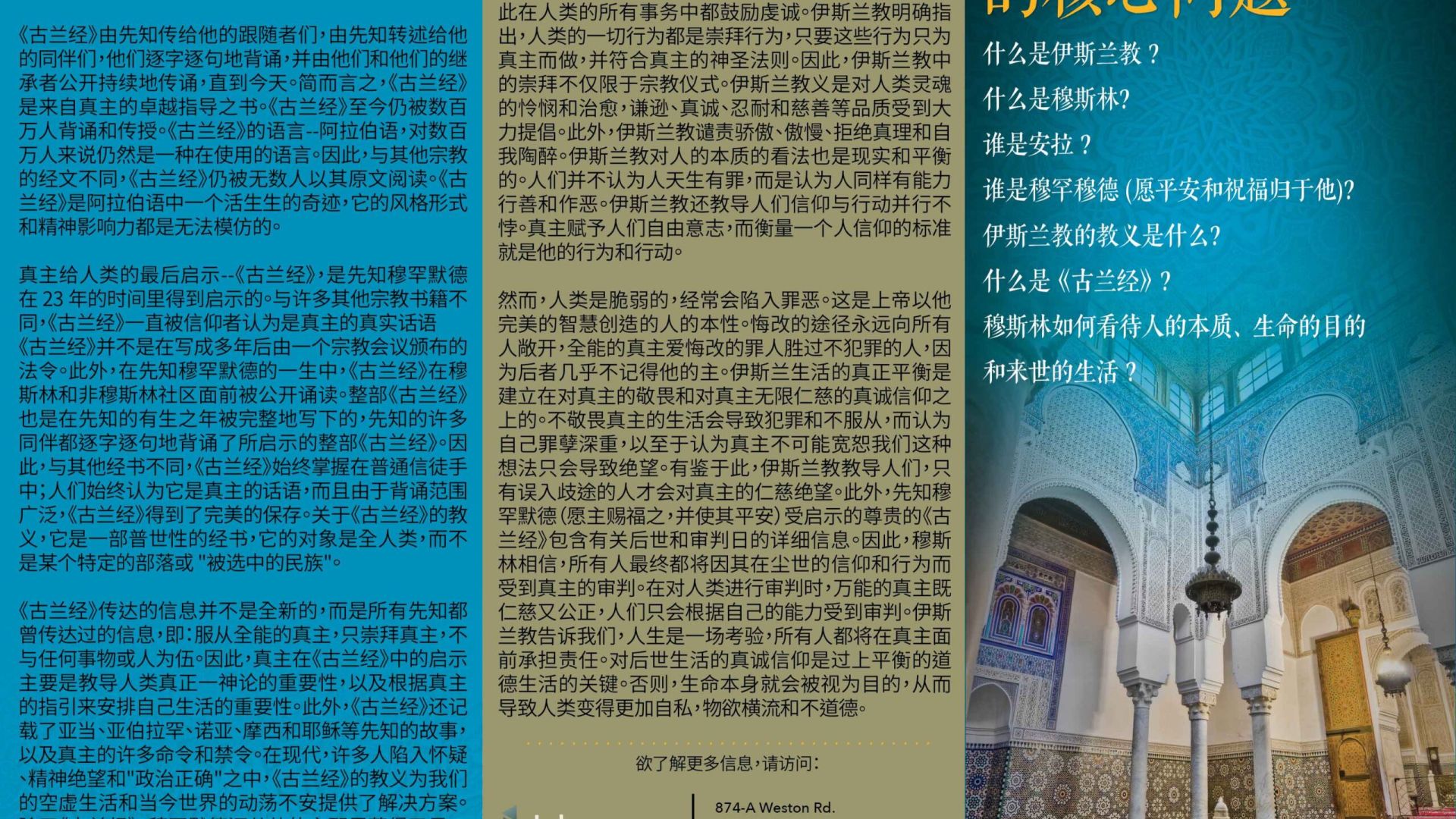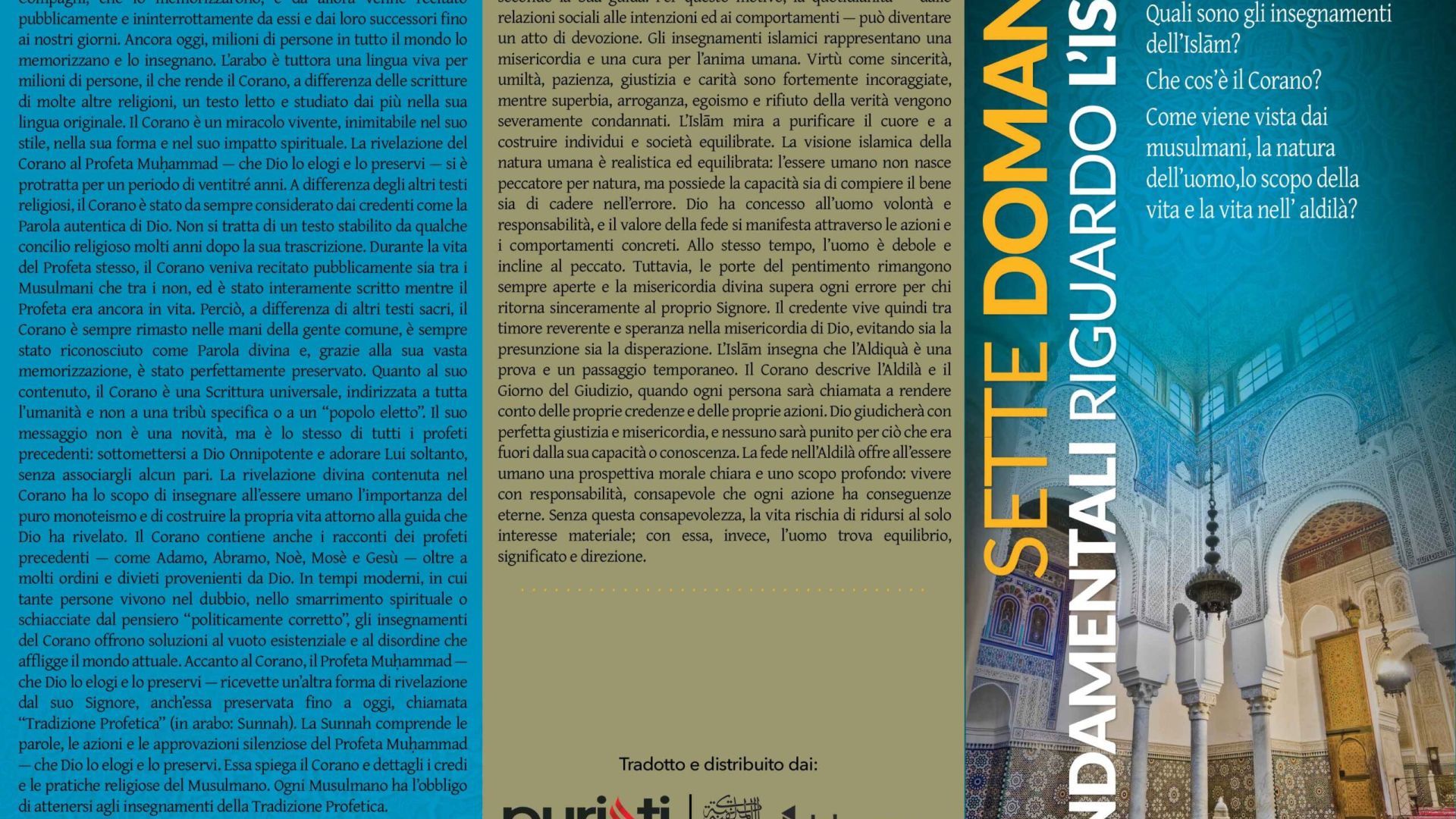The Recognition of Islām by Christian Rulers of the Past
Shaykh al-Islām Ibn Taymiyyah
During the time of the Prophet (ﷺ), Islam was acknowledged among some of the misguided rulers. Among them was the King of Abyssinia who accepted migrants from the companions of the Messenger (ﷺ). Heraculius of Rome also regarded Islam as the truth and bore the mockery of his court because of it.
The Recognition of Islām by Christian Rulers of the Past
Shaykh al-Islām Ibn Taymiyyah
During the time of the Prophet (ﷺ), Islam was acknowledged among some of the misguided rulers. Among them was the King of Abyssinia who accepted migrants from the companions of the Messenger (ﷺ). Heraculius of Rome also regarded Islam as the truth and bore the mockery of his court because of it.


A plethora of people from among the Jews and Christians, their leaders and others, believed fully in the Prophet [Muḥammad (صلى الله عليه وسلم)] when it became clear to them that he was a messenger of Allāh sent to them.
- Part 1: Al-Najāshī Receives Migrants from the Companions of Muḥammad
- Part 2: Al-Najāshī’s Conversion to Islām
- Part 3: The Conversion of Heraclius of Rome and His Subsequent Assassination
Part 1: Al-Najāshī Receives Migrants from the Companions of Muḥammad
As Najāshī, the King of Abyssinia believed in him. He and his people were Christians. Their belief began at the very start of the matter [i.e. daʿwah] of the Prophet (صلى الله عليه وسلم) when his companions were being persecuted in Makkah.
The disbelievers were constantly oppressing, harming, and torturing them for their belief in Allāh and His Messenger (صلى الله عليه وسلم). Thus, a party from among the companions emigrated to him including ʿUthmān ibn ʿAffān, ʿAbd al-Raḥmān ibn ʿAwf, al-Zubayr ibn ʿAwwām, ʿAbdullah ibn Masʿūd, Jaʿfar ibn Abī Ṭālib and other men and woman [from Makkah]. [Al-Najāshī] was a just ruler so when the disbelievers sent after them messengers bearing gifts to him in the hopes he would return the emigrating group to them, he refused to acquiesce the emigrants to them until he heard from them. Upon hearing their words and what they relayed from the Prophet (صلى الله عليه وسلم), he chose to believe in him and accommodate the migrants.
On hearing the Qurʾān he said: ‘Truly, this and that which Mūsá bore has come from but one source.’ When he then asked them concerning the Messiah (صلى الله عليه وسلم), they replied: ‘We testify that he is a servant of Allāh and His Messenger and His word which He directed to the Virgin Mary, the maiden who was never touched by any man [i.e. intercourse].’ Al-Najāshī replied to Jaʿfar ibn Abī Ṭālib: ‘By Allāh! ʿĪsá the Son of Mary did not exceed what you have just uttered [even as much as] this stick.’ His companions snorted [in derision] at this, so he said: ‘In spite of your snorting, in spite of your snorting.’ He then sent his son and a party of his people to the Prophet (صلى الله عليه وسلم) with Jaʿfar ibn Abī Ṭālib. Jaʿfar met the Prophet (صلى الله عليه وسلم) in the year of Khaybar.
Their story has been mentioned by a large group of jurists and scholars of ḥadīth, like Aḥmad ibn Ḥanbal in ‘Al-Musnad’, Ibn Saʿd in ‘Al-Ṭabaqāt’, Abī Nuʿaym in ‘Al-Hilyah’, and other than them. It has also similarly been mentioned by scholars of tafsīr, ḥadīth, and fiqh just as it is confirmed from multiple independent lines of inquiry [mutawātir] by these scholars.
Part 2: Al-Najāshī’s Conversion
When [the Makkan immigrants came]2 to him [al-Najāshī] he asked them: ‘What is this religion that has caused you to divide yourselves from your own people, and have refused entry into my religion or the religion of any people [i.e. the People of the Book or polytheists]?’
The one who spoke from among them [Makkan immigrants] was Jaʿfar ibn Abī Ṭālib who replied to him: ‘O King! We were but a people of ignorance. We worshipped idols, ate dead animals, and engaged in obscene fornication. We used to cut our ties of kinship, act treacherously to our neighbours, and the strong among us would eat [impose their will] upon the weak.
We were upon this until Allāh raised from among us a messenger to us; his lineage, truthfulness, trustworthiness, and modesty were all well-known to us. He called us to Allāh such that we declare His Oneness, that we worship Him, and leave the stones and idols we and our forefathers used to worship besides Him. He ordered us to be truthful in our speech, to fulfill our covenants, to join the ties of kinship, to be good to our neighbours, to refrain from all prohibited matters, and blood [i.e. that which is spilled out of the sacrifice]. He forbade us from engaging in obscenities [fornication], giving false testimony, exorbitantly eating the wealth of the orphans, and accusing virgins of fornication [i.e. defamation without evidence]. He ordered us to worship Allāh, to never associate anything with Him [in worship], to perform ṣalāh, pay zakāh, and to fast.
Umm Salamah [narrator of the occurrence] said: He enumerated the matters of Islām. He then said: So we testified to his truthfulness, believed in him, and followed him in everything he came with. We worshipped Allāh alone, we never associated anything with Him, we enacted the prohibition of what he forbade us from and enacted the permissibility of that which he allowed. Our people [then] acted in enmity against us. They tortured us and tried to turn us away from our religion such that we should return to the worship of idols over the worship of Allāh. And that we should enact the permissibility of those detestable things we used to engage in before. So when they attempted to subjugate us, oppress us, make our lives burdensome, and come between us and our religion, we came to your country and chose you over those other than you. We desired to live by your side as we hoped that we shall not be oppressed by you. Al-Najāshī said: ‘Do you possess anything that he has come with which Allāh has revealed [to him]?’
[Umm Salamah] said: ‘Jaʿfar said: ‘Yes.’ He replied: ‘Read it for me.’ [Umm Salamah said] ‘So he read for him the beginning of Sūrah Maryam.’ Umm Salamah (may Allāh be pleased with her) said: ‘So al-Najāshī—by Allāh!—cried until his beard became moist, and his bishops cried until the bibles [they held] were wet upon hearing what had been recited to them.
Then al-Najāshī said: ‘Truly, this and that which Mūsā came with has been brought forth from the same source.’ He then said to ʿAbdullah ibn Abī Rabīʿah and ʿAmr ibn al-ʿAāṣ:3 ‘Leave! For I will undoubtedly never surrender them to you.’ Umm Salamah said: ‘When they left, ʿAmr ibn al-ʿAāṣ said: ‘By Allāh! I will come to him tomorrow and clarify their errors and extirpate the ranks [of their support]’ [Umm Salamah] said: ‘ʿAbdullāh ibn Abī Rabīʿah—who was the more pious of the two in our estimations—said [to him]: ‘Do not do that; for they have close relatives among us even if they openly defy us.’ He replied: ’By Allāh! I will tell them that they claim that ʿĪsā the son of Mary was a servant [of Allāh].’ [Umm Salamah] said: ‘So they came to him [al-Najāshī] the following day and said: ‘O King! They have claimed regarding ʿĪsā the son of Mary a magnanimous thing. So bring them and ask them what they say concerning him.’
She said: ‘So he called them to ask them and there had been no occurrence more grave than this request. So the people [migrants] gathered and said to one another: ‘What will you say concerning ʿĪsā if you are asked about him?’ They replied: ‘We will say, by Allāh, that which Allāh has said about him and that which our Prophet (صلى الله عليه وسلم) has come with. The reality of this matter is as they have related.’ So when they [the Muslims] entered upon him [al-Najāshī], he said to them: ‘What do you say concerning ʿĪsā the son of Mary?’ Jaʿfar ibn Abī Ṭālib replied: ‘We say concerning him that which our Prophet [may the peace and blessings of Allāh be upon him] has come with: He is but a servant of Allāh, His messenger, His soul [which He created], and His word [‘Be’] which he has directed to Mary the Virgin maiden [in conception].’ Umm Salamah said: ‘So al-Najāshī struck the ground and picked up a stick and said: ‘ʿĪsā the son of Mary did not exceed your saying even as much as this stick.’
Upon him saying this, his bishops around him snorted [in derision] so he said to them: ‘Even if you snort! By Allāh! Go forth, for you will be safe in my land. Whomsoever insults you shall indeed have a fine imposed upon him, then an imposed fine, then an imposed fine! For they could not give me even a mountain of gold in return for harming a single man from among you. So return their gifts to them [the Makkan polytheists], for we have no use for them. For Allāh Himself did not take a bribe from me in order to regain this kingdom such that I should now take a bribe from the likes of them. Neither do I follow [the desires] of the people in my own kingdom such that I should follow [their desires] now.’
Part 3: The Conversion of Heraclius of Rome and His Subsequent Assassination
In al-Bukhārī and Muslim and the wording is from al-Bukhārī:4 Narrated by ʿAbdullāh ibn ʿAbbās that Sufyān ibn Ḥarb was requested to attend an audience with Heraclius of Rome whilst he was part of a Qurayshī caravan that was trading in the land of al-Shām during the time of the peace treaty with the Messenger of Allāh (صلى الله عليه وسلم) which was conducted with Abū Sufyān ibn Ḥarb and the disbelievers of Quraysh. So he [Abū Sufyān] came to him [Heraclius] in Īliā.
He called him to a gathering surrounded by Roman officials and requested a translator. He [Heraclius] said: ‘Whom among you is closest in lineage to this man who claims to be a prophet?’ Abū Sufyān said: ‘I said: ‘I am the closest of them [to him] in lineage’.’ He [Heraclius] ordered him and his companions to come close until they were in front of him, then he said to his translator [to say to the other disbelieving Qurayshis]: ‘I ask concerning this man if he lies then tell me he is lying.’ Abū Sufyān said: ‘If it was not for modesty from being labeled as a liar, I would indeed lie regarding him.’ [Abū Sufyān said]: ‘The first question he asked me was: ‘How is his lineage among you?’ I replied: ‘He is a person of reputable lineage among us.’ Heraclius replied: ‘Has anyone before him ever uttered a similar claim?’ I [Abū Sufyān] said: ‘No.’ He [Heraclius] said: ‘Were any of his forefathers kings?’ I [Abū Sufyān] said: ‘No.’ He said: ‘Are his followers the most revered people or the weakest of them?’ I said: ‘The weakest of them.’ He said: ‘Are they increasing in number or decreasing?’ I said: ‘They increase.’ He said: ‘Has anyone apostated out of annoyance from his religion after entering it?’ I said: ‘No.’ He said: ‘Has he ever been accused of lying before he began alleging what he now claims?’ I said: ‘No.’ He said: ‘Has he ever acted treacherously?’ I said: ‘No, and we currently are in a period [imposed] by him whilst we do not know what he will do.’ He said: ‘Have you fought?’ I said: ‘Yes.’ He said: ‘How was your fight with him?’ I said: ‘The battle had varying success. We took some of theirs, and they some of ours.’ He said: ‘What does he order you to do?’ I said: ‘He says: Worship Allāh alone and do not associate anything with Him and leave that which your forefathers used to say. He orders us with ṣalāh, truthfulness, modesty, and joining the ties of kinship.’ He then said to the translator: ‘I asked concerning his lineage and you said he was of a reputable lineage and such are the lineages of the prophets among their people. I asked if anyone had ever made a similar claim before him and you answered no. I say: If someone had said a similar word before him I could say that he is but a man who is imitating those who came before him. I asked if any of his forefathers were kings and you answered no. I say: If some of his forefathers were kings I could say he is but a man who seeks the kingship of his forefathers. I asked if you had accused him of lying before he began claiming what he alleges now and you answered no. I am sure that he would not leave lying in the affairs of his people while he lies concerning Allāh. I asked you if the most reputable people among you follow him or the weakest of them and you answered that the weak follow him and such are the followers of all the prophets. I asked if his numbers increase or decrease and you answered that they increase and such is the matter of īmān. It continues to increase until it reaches completion. I asked whether anyone had apostated out of annoyance towards his religion after entering into it and you answered no. Such is true īmān when it enters the corners of the heart, nothing can cause it to waiver in annoyance. I asked you if he has behaved treacherously and you answered no and such are the prophets; always innocent of treachery. I asked you what he orders you to do and you answered that he orders you to worship Allāh and not to associate anything with Him, and that he forbids you from the worship of idols, and he orders you with ṣalāh, truthfulness, and modesty. If what you say is true, he will indeed take the place of my two feet.5 For I knew he would become apparent, but I never thought he would be from yourselves.
If I knew that I could finally arrive at him, I would endure all hardships for that meeting. For if I was with him, I would wash his feet. He then called for the letter of the Messenger of Allāh (صلى الله عليه وسلم) which was sent with Diḥyah al-Kalbī to the leader of Baṣrāh who then sent it to Heraclius. He read the letter, its contents were as follows: ‘In the Name of Allāh, The Most Merciful (to His creation), the Ever Merciful (to His believing servants). From Muḥammad, a servant and messenger of Allāh to Heraclius, the emperor of Rome. Peace be upon those who follow guidance. As for what follows: Verily, I invite you towards the call of Islām. Become Muslim and be safe [from Allāh’s torment]. Be Muslim, and Allāh will reward you twice [once for believing in ʿĪsá and then for believing in Muḥammad, may the peace and blessings of Allāh be upon them both]. If you turn away, then the sin of the peasants [underlings] will fall upon you. And O People of the Scripture, come to a just word between us and you: That we worship none but Allāh (alone) and that we do not associate anything with Him (in His worship) and that we do not take among ourselves, lords besides Allāh (who are given unrestricted obedience).” So if they turn away (in rejection) then say: “Bear witness that we are Muslims (who worship and obey Him alone).’…
When Heraclius read his letter and had [later] gathered the Romans, they objected to it. [To the point] where on Sunday his archbishops refused to attend before him, claiming ailments. After requesting their attendance thrice and being refused, he rode to them and said: ‘Do you not know that he is the Messenger of Allāh (صلى الله عليه وسلم)?’ [His bishops] said: ‘Certainly.’ He said: ‘Do you not see what they [the Romans] will label me as, while you are the most obedient of them to me. So come and let us call them [to Islām].’ [The bishop] replied: ‘Do I have your permission?’ He said: ‘Yes.’ He replied: ‘Then go, I am behind you.’ So [Heraclius] entered, accompanied by his people, to the greatest of their churches. Upon entering, the [denizens of the church], the king, and others, fell down in prostration to him. He stood at [the church’s] altar and proclaimed: ‘O children of the dead! This [Muḥammad (صلى الله عليه وسلم)] is the one whom ʿĪsá gave us glad tidings regarding and I testify that there is nothing worshipped in truth except for Allāh and that Muḥammad (صلى الله عليه وسلم) is the Messenger of Allāh.’ They [the Romans] snorted together and then pounced upon him. They bit into him with their mouths until they had killed him. Then, they surgically removed his ribs using a pair of tongs until he died.
Endnotes:
[1] Al-Jawāb al-Ṣaḥīḥ: 247-249
[2] Al-Jawāb al-Ṣaḥīḥ: 254-266
[3] At the time the two were Makkan polytheists attempting to capture and return the Muslim migrants back to Makkah but converted to Islām later on [ʿAbdullah at the conquest of Makkah in 9 AH, and ʿAmr after the treaty of Hudaybiyyah in 6 AH].
[4] Al-Jawāb al-Ṣaḥīḥ: 282-290
[5] Heraclius references the Muslim empire conquering Rome, which did occur later on.
Translated by: Riyāḍ al-Kanadī
Most Popular: Last 30 Days

Everyone’s Speech Is Subject to Acceptance or Rejection Except the Prophet (ﷺ)











